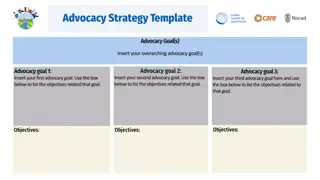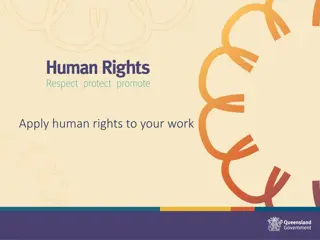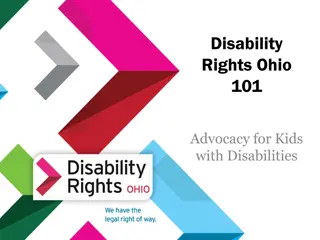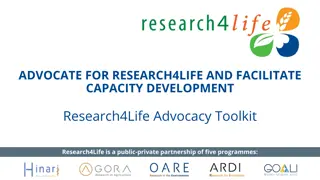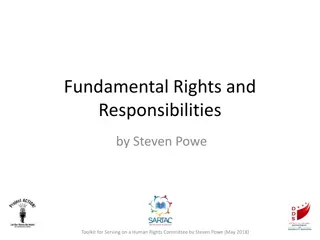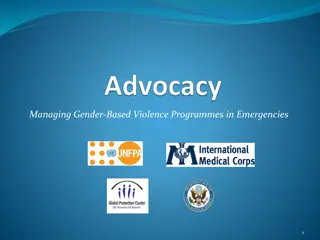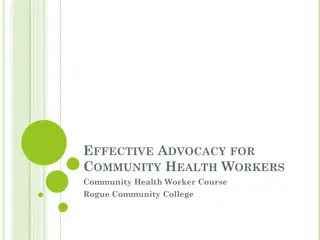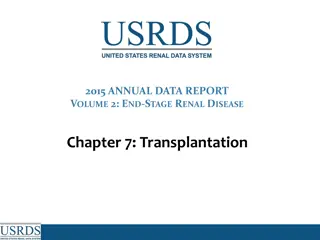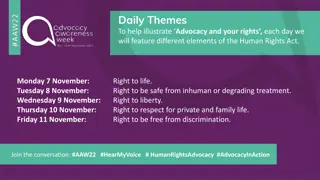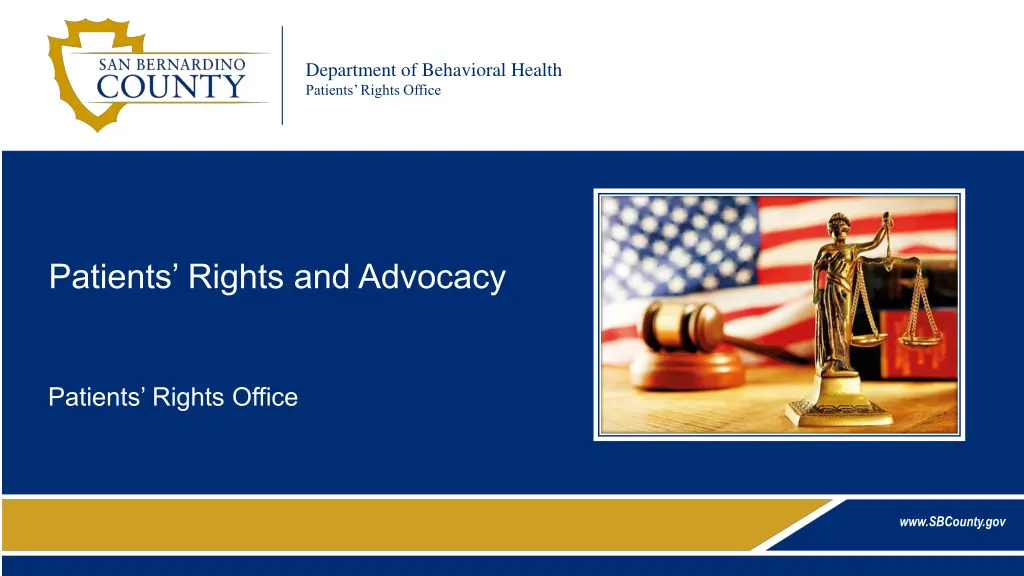
Patients Rights Advocacy | San Bernardino County Overview
"Learn about the Patients Rights Office in San Bernardino County, their mission, team members, training objectives, and the history and intent of the Lanterman-Petris-Short Act. Discover how they protect the rights of behavioral health consumers and provide essential advocacy services."
Download Presentation

Please find below an Image/Link to download the presentation.
The content on the website is provided AS IS for your information and personal use only. It may not be sold, licensed, or shared on other websites without obtaining consent from the author. If you encounter any issues during the download, it is possible that the publisher has removed the file from their server.
You are allowed to download the files provided on this website for personal or commercial use, subject to the condition that they are used lawfully. All files are the property of their respective owners.
The content on the website is provided AS IS for your information and personal use only. It may not be sold, licensed, or shared on other websites without obtaining consent from the author.
E N D
Presentation Transcript
Department of Behavioral Health Patients Rights Office Patients Rights and Advocacy Patients Rights Office www.SBCounty.gov
Your County Patients Rights Team Page 2 CHIEF PATIENTS RIGHTS ADVOCATE: Mariam Aldaz, LMFT Program Manager I Gavina Urena, Office Assistant III PATIENTS RIGHTS ADVOCATE TEAM: Jennifer Arnold Weaver, Clinical Therapist II Kellie Bougard Jordan, Clinical Therapist II Jose Orrostieta, Social Worker II Sally Mitchell, Social Worker II Angelica Rea, Social Worker II Bethany Sahagun, Social Worker II Trainee Clinical Therapist I-Vacant
Presentation Training Objectives Page 3 Brief Overview of the Lanterman-Petris-Short (LPS) Act Overview of County Patients Rights Advocacy Patients Rights Involuntary/Voluntary Status 5150 information - Application and goals 5250 information - Application and goals Due Process, Representation and LPS Facilities Responsibilities Discharge Planning - SB 1152 Discharge Planning for Homeless Patients Minors Rights and Considerations
Mission Statement for Patients Rights Page 4 Our mission and function for San Bernardino County Patients Rights Advocates is to protect the legal, civil and human rights of all behavioral health consumers in our County. Our goal is achieved by: Supporting the patients expressed needs Rigorous monitoring of our LPS Facilities and Locked Residential Facilities Providing Patients Rights training to behavioral health providers Advocating and promoting the treatment of patients with dignity and respect
Brief History and Intent of Lanterman-Petris-Short (LPS) Act Page 5 HISTORY: Signed into law in 1967 Applies to mentally disordered, developmentally disabled and mentally impaired due to chronic alcoholism Governs involuntary civil commitment for psychiatric treatment Established a state Patients Rights Office/Advocacy System INTENT of LPS: To end inappropriate, indefinite, and involuntary commitment To provide prompt evaluation and treatment To safeguard individual rights through judicial review To encourage the full use of all existing agencies To provide individualized treatment, supervision, and placement services through a conservatorship program To protect mentally challenged persons from criminal acts To guarantee and protects public safety
The Advocacy System Page 6 State mandated system: The State Office of Patients Rights (California Office of Patients Rights/COPR) State Hospital Patients Right Advocates (Patton, Metro ) County Patients Rights Advocates (SB County, Riverside Co., LA Co ) Focus is expressed interest: Represent expressed interest of the client as defined by the client Do not determine what is appropriate or in the best interest of the client Different from a traditional clinical approach
Authority of Patients Rights Advocates Page 7 County Patients Rights Advocates (PRAs) shall: Have access to all patients and other recipients of behavioral health services in any BH facility, program, or services at all times as are necessary to investigate or resolve specific complaints Have access to BH facilities, program, and services and recipients of services during normal working hours and visiting hours for other advocacy purposes Have the right to interview all persons providing the patient with diagnostic or treatment services Meet privately with patients Provide notification of the availability of advocacy services and information about patients rights by distributing educational materials and discussion in groups and with individual patients Inspect and copy patient records with patients authorization Welfare and Institution Code (WIC) 5522-5546
The Value of Advocacy Page 8 For Behavioral Health (BH) Consumers: Help resolve problems; increases patients autonomy, dignity, self-esteem, independence For Mental Health Professionals: Advocates are an extra pair of hands; assist in improving communication, diffuse tension & resolve conflict; improves patient s functioning level /sense of self when they are empowered For Mental Health Facilities: Advocates external position helps identify systemic problems; assist in the development /improvement of P&P s; Assist in preventing future patients rights complaints and/or violations; helps the Behavioral Health System become more responsive to patient concerns; improves the delivery of behavioral health services
Patients Rights Page 9 For clarification, Patients Rights have be divided into two groups: Undeniable: Cannot be denied Constitutional Rights: Rights guaranteed to all people by the Federal Constitution and California Law Treatment Rights: Rights related to treatment Deniable: Can be denied with Good Cause Relevant to inpatient or residential facilities May not be waived by the person, guardian, or conservator Upon admission to a facility each client shall immediately be given a copy of a California DHCS Mental Health Patients Rights Handbook (WIC 5325).
Constitutional & Treatment Rights Undeniable Rights Page 10 Dignity, privacy, and humane care Religious freedom & practice Physical exercise & recreational opportunities Social interaction & participation in community activities Free from harm: Unnecessary or excessive physical restraint, isolation, medication, abuse, or neglect Treatment services that promote independence Least restrictive treatment Prompt medical care Participate in appropriate programs of publically funded education (minor s right) Free from hazardous procedures
More Treatment Rights (Undeniable) Page 11 To consent or refuse to consent to treatment including antipsychotic medication Except in an EMERGENCY To see & receive the services of a patient advocate To refuse psychosurgery To language services Confidentially Informed consent to treatment & medication Participate in individualized treatment planning To be informed of complaint procedures and appeals process Inspect & obtain a copy of their medical record An aftercare plan WIC 5325.1, 5325.2, 5327, 5328, 5622
Treatment with Antipsychotic/Psychotropic Medication Page 12 Antipsychotic medication may only be administered to a patient under the following circumstances: Informed Consent: Signed by patient or authorized by physician s signature Court Order: Medication Capacity Hearing ( Med Comp / Riese Hearing) Emergency: Defined by WIC 5008 (m), 5332 (e) and CCR Title 9 section 853 Consent of LPS Conservator: Only if the conservator is granted this power Always review Conservatorship Letters to determine who holds the power to consent/refuse treatment with medication WIC 5332
Inpatient Rights (Deniable) Page 13 These rights may only be denied with GOOD CAUSE : Wear own clothing Keep & use personal possessions Keep and be allowed to spend a reasonable sum of money (residential facilities) Have access to individual storage space for private use To see visitors every day Have reasonable access to telephones; to make and received confidential calls or to have such calls made for them Have ready access to letter-writing materials; to mail and received unopened correspondences To refuse ECT (only deniable under WIC 5326.7) WIC 5325
Good Cause Good Cause for Denial of Rights Page 14 Good Cause exists when the Professional Person in Charge (PIC) or designee has good reason to believe that the right, if exercised: Would be injurious to the patient or others Would seriously infringe on the rights of others Would cause serious damage to the facility AND There is no less restrictive way of protecting the interest specified The justification must be related to the specific right denied Rights shall not be denied as a punitive measure or for the convenience of staff Rights shall not be considered a privilege to be earned Rights cannot be waived or denied as a treatment modality WIC 5326, CCR Title 9 Section 865.1
Documentation of Denial of Rights (DOR) Page 15 Each Denial of Right (DOR): Shall be noted in the treatment record Date & time of the DOR Specific right denied Good cause for DOR Date of review if denial was extended beyond 30-days Signature of the Professional PIC or designee authorizing the DOR Patient shall be told of the content of the DOR notation Each DOR shall be documented regardless of the gravity of the reason, the frequency a right is denied in a particular facility, or for a particular individual. CCR Title 9 Section 865.3
Restoration of Rights Page 16 A right shall not continue to be denied when good cause no longer exists. Staff should use the least restrictive means of managing the behavior problem which led to the DOR The date a right is restored shall be documented in the patient s treatment record CCR Title 9 Section 865.5
Denial of Rights Monthly Tally (DHCS 1803) Page 17 Quarterly, each local behavioral health director shall provide to the Director of Health Care Services (DHCS) the facility reports of the number of persons whose rights were denied and the right or rights which were denied. WIC 5326.1, CCR Title 9 Section 866
Acute Inpatient Psychiatric Services & LPS Regulations for Involuntary Treatment Page 18 WIC 5003: Nothing in this part shall be construed in any way as limiting the right of any person to application at any time to any public or private agency or practitioner for mental health services, either by direct application in person, or by referral from any other public or private agency or practitioner. make a voluntary PLEASE NOTE: LPS requires assessment for voluntary treatment (VOL) prior to initiating any involuntary hold.
LPS Involuntary Holds -in San Bernardino County Page 19 Danger to Self (DTS), Danger to Others (DTO), and Gravely Disabled (GD) WIC 5150 (DTS, DTO, or GD): Up to 72-hours psych evaluation, crisis intervention and/ or treatment Written by Peace Officers or County Authorized Writers WIC 5585 (DTS, DTO, or GD): Same as 5150, but for Minors WIC 5200 (DTS, DTO, or GD): Court Ordered Psych Evaluation up to 72-Hours Petitioned by an individual in the community and must be ordered by Superior Court Judge WIC 5250 (DTS, DTO or GD): Up to 14-days for Intensive Psychiatric Treatment Initiated by treating psychiatrist WIC 5260 (DTS only ): Detention up to 14-additional days; Imminent Threat for Suicide Initiated by psychiatrist WIC 5300 (DTO only): Detention up to 180-additional days; Imminently dangerous person Court Process Temporary Conservatorship/LPS Conservatorship (GD only): Court Process PLEASE NOTE: The WIC 5270 detention, up to an additional 30-days for GD, is not authorized in SB County. WIC 5150 - 5372
Definitions of Gravely Disabled (GD) Page 20 Adult: Gravely disabled means: A condition in which a person, as a result of a mental health disorder or impairment by chronic alcoholism, is unable to provide for his or her basic personal needs for food, clothing, or shelter. A person is not gravely disabled if that person can survive safely without involuntary detention with the help of responsible family, friends, or others who are both willing and able to help provide for the person s basic personal needs for food, clothing, or shelter. The term gravely disabled does not include persons with intellectual disabilities by reason of that disability alone. Minor: Gravely disabled minor means: A minor who, as a result of a mental disorder, is unable to use the elements of life that are essential to health, safety, and development, including food, clothing, and shelter, even though provided to the minor by others. Intellectual disability, epilepsy, or other developmental disabilities, alcoholism, other drug abuse, or repeated antisocial behavior do not, by themselves, constitute a mental disorder. WIC 5008 (h)(1)(A), 5008(h)(2), 5008(h)(3), 5250 (d)(1), 5585.25
WIC 5150: Involuntary Detention up to 72-hours Page 21 When a person as a result of mental disorder is a DTS, DTO, or GD, a peace office or authorized writer may, upon probable cause, take or cause a person to be taken into custody up to 72-hour for assessment, evaluation, and crisis intervention, or placement for evaluation and treatment in a county designated facility*. If the person can be properly served without being detained, then he or she shall be provided services on a voluntary basis. A preadmission assessment (WIC 5151) to determine the appropriateness of involuntary detention must be completed prior to admitting a person to the designated facility for treatment *San Bernardino County designated facilities include: VAMC-Loma Linda -Fully Designated ARMC -Fully Designated Loma Linda University Behavioral Medicine Center Canyon Ridge Hospital Community Hospital of San Bernardino-BH Units Only WIC 5150, 5151
5150 Application: DHCS 1801 (06/18) Page 22 Please Remember The 5150 Application may only be initiated and completed by a peace authorized writer of the County. officer or an WIC 5150
Involuntary Patient Advisement: DHCS 1802 Involuntary Patient Advisement: DHCS 1802 Page 23 Each person admitted to a facility designated by the county for evaluation and treatment shall be given the following information (orally and in writing) by admission staff of the facility: In a language or modality accessible for the person In English and the language that is the primary means of communication Must include phone number to county Patients Rights Office WIC 5150 (h)
Prior to expiration of 72-Hours Page 24 Before the 5150 expires, the patient must be assessed for a safe discharge or of needing further treatment. If needing further treatment: Assess for voluntary treatment (willing and able) An application for voluntary treatment must be signed and/or authorized by the MD If no VOL, and meets criteria, 5250 Hold for Intensive Treatment: MD order for 5250 Notice of Certification must be written, signed and delivered Documentation of legal status change (VOL or 5250) before the 72-hour expires is necessary to determine if further involuntary detention was legally imposed by the facility. WIC 5250, 5259.1
WIC 5250: Certification for Intensive Treatment Page 25 WIC 5250: Detention for Intensive Treatment Detention for no more than 14-days. Criteria determined by a recent psychiatrist assessment. Criteria: DTS/DTO and/or GD; Mental Disorder or Chronic Alcoholism. Notice of Certification document signed by 2-people. First, the psychiatrist or physician or designee that performed the evaluation shall sign signature on illustrated 1starrow. Second, signature can be a psychiatrist, physician, psychologist, LMFT or LCSW or R/N who participated in the evaluation. Copy personally delivered to patient and patients attorney or advocate. Copy also goes to any person designated by the patient as soon as capable of designating. WIC 5251, 5252, 5253.
Delivering the Notice of Certification Page 26 The person delivering a copy of the Notice of Certification to the patient shall, at the time of delivery: Inform the patient they are entitled to: A CRH within 4-6 days to determine if probable cause exists, unless judicial review is requested. Be informed of the rights with respect to the hearing, including the right to the assistance of another person to prepare for the hearing andto answer questions and concerns regarding their involuntary detention. Inform the patient of their right to: Request a judicial review by habeas corpus (writ of habeas corpus). Explain the term, writ of habeas corpus . Inform patient of right to counsel, including court- appointed counsel. Sign the attestation at the bottom of the 5250. 3rd Signature WIC 5254-5254.1
5250 & Due Process Rights Page 27 Why do we do Hearings? The Fifth Amendment of the United States Constitution states, "No person shall be deprived of life, liberty, or property, without due process of law. To safeguard individual rights through judicial review is also an intention of the LPS Act cited in WIC 5001(d). Due process is guaranteed to patients detained by LPS provisions by way of a: Certification Review Hearing (CRH) aka 5250 Hearing Informal Probable Cause Hearing Officiated by a AdministrativeHearing Officer Automaticallyscheduled Writ of Habeas Corpus aka Writ Formal Request for Release-Court Hearing Officiated by a Superior Court Judge May only be requested by the patient or patients representative, advocate, or attorney
Due Process and Representation Page 28 Role and Responsibility of the Patients Rights Office: Meet with the patient to explained the 5250 and Certification Review Hearing (CRH) process Assist the patient in preparing for the CRH Answer any other questions about their involuntary detention and due process rights Represent the patient at the CRH Role and Responsibility of the Mental Health Court: Writ of Habeas Corpus (Attorney meets/represents patient) Medication Capacity Hearing aka Med Comp or Riese Hearing (Attorney meets/represents patient) Temporary Conservatorship Process aka T-CON (Attorney meets/represents patient) LPS Conservatorship Hearings and other Court Hearings (Attorney meets/represents pt.)
LPS Facility and Certification Review Hearing Page 29 Role and Responsibility of the LPS Facility: Facilitate access to necessary legal documents to the County Patients Rights Office Provide a private space for the patient and the patients advocate to meet Provide a location for the CRH that is private and least disruptive to the patients treatment Develop policies/procedures to ensure compliance and uniformity with implementing the CRH process WIC 5250: If a person is detained for 72 hours and has received an evaluation, he or she may be certified for not more than 14 days of intensive treatment under the following conditions The facility providing intensive treatment is designated by the county to provide intensive treatment, and agrees to admit the person. No facility shall be designated to provide intensive treatment unless it complies with the Certification Review Hearing
WIC 5275: Writ of Habeas Corpus (Request for Release) Page 30 REMEMBER Every person detained by WIC 5250 shall have the right to a hearing by Writ of Habeas Corpus for his or her release. The request for a Writ of Habeas Corpus: Can be made by the patient or person acting on patients behalf (advocate, attorney or authorized representative) Can be made to any member of the treatment staff (review current facility protocol) Can be made at any time during the 14-day period of detention; before and after Certification Review Hearing If Writ is requested prior to the Certification Hearing, then no Certification Hearing
Discharge Planning: HSC 1262, WIC 5622, WIC 5768.5 Page 31 When a mental health patient is being discharged the patient and the patient s conservator, guardian, or other legally authorized representative shall be given a written aftercare plan prior to the patient s discharge from the facility. The written aftercare plan shall include, to the extent known, all of the following components: The nature of the illness and follow up required Medications including side effects and dosage schedules Expected course of recovery Recommendations regarding treatment that are relevant to the patient s care Referrals to providers of medical and mental health services Other relevant information The patient shall be advised by facility personnel that he or she may designate another person to receive a copy of the aftercare plan A patient who is released from the facility may refuse any or all services under the written aftercare plan Each hospital shall have a written discharge planning policy and process (HSC 1262.5) Aftercare plan for minors shall include educational or training needs, provided these are necessary for the minor s well-being (WIC 5585.57)
SB 1152 Discharge Criteria for the Homeless Page 32 On January 01, 2019, hospitals needed to add a homeless patient discharge planning policy and process. The newly required elements of the written policy are: Purpose of Policy Ask patient about housing status; document answer Nondiscrimination provision Provide information about discharge to patient in a culturally competent manner An individual discharge plan must be prepared for each homeless patient Discharge planning will be guided by the best interests of the homeless patient, his or her physical and mental condition, and his or her preferences for placement How to identify a post-discharge destination for each patient Services that must be offered to the homeless patient prior to discharge Maintain a log of homeless patients discharged and the destinations to which they were released after discharge (by July 01, 2019)
SB 1152 Discharge Criteria for the Homeless (continued) Page 33 On July 01, 2019, hospitals were required to implement the written plan for coordinating services and referrals for homeless patients with the available: County behavioral health agency Health care and social services agencies in the region Other health care providers Nonprofit social services providers
MORE ON MINORS: Childrens Civil Commitment and Mental Health Treatment Act of 1988 Page 34 Assembly Bill 4642 passed in 1988 (WIC 5585) added provisions to protect minors rights, parental rights and to address the health and welfare of the minor. The intent of the Act is: To provide prompt evaluation and treatment of mentally disordered minors To safeguard the rights to due process for minors and their families To provide individualized treatment, supervision, and placement services for gravely disabled minors To prevent severe and long-term mental disabilities among minors through early identification, effective family service interventions, and public education It also established a separate definition for gravely disabled minor (WIC 5585.25) Behavioral Health www.SBCounty.gov
What is a Minor Page 35 An individual under the age of 18 years old not: Married or divorced Currently in active military duty Legally emancipated by the court Court will only emancipate a minor if all criteria met: Be at least 14 years of age Willing to live apart from parent or guardian Able to manage their own financial affairs Income is not derived from criminal activity Behavioral Health www.SBCounty.gov
What is 5585 Hold? Page 36 WIC 5585.50 states: When a Minor, as a result of a mental disorder is a DTO, DTS and/or GD and authorization for voluntary treatment is not available: A Peace Officer or Person Designated by the County may, upon probable cause, take or cause a minor to be taken into custody Placed in a facility designated by the county and approved by the State Department of Health Care Services (DHCS) as a facility for 72-hour treatment and evaluation of minors. The facility shall make every effort to notify the minor s parent or legal guardian as soon as possible after the minor is detained The facility shall require an application in writing stating probable cause for DTO, DTS and/or GD and authorization for voluntary treatment is not available. * The 5585 is essentially the same at the 5150 , but has additional safeguards to prevent the unnecessary detention of minors. Behavioral Health www.SBCounty.gov
WIC 5585.52: Clinical Evaluation Page 37 WIC Section 5585.52 requires: Any minor detained under the provisions of Section 5585.50 shall receive a clinical evaluation consisting of multidisciplinary professional analyses of the minor s medical, psychological, developmental, educational, social, financial, and legal conditions as may appear to constitute a problem This evaluation shallinclude a psychosocial evaluation of the family or living environment, or both. Persons providing evaluation services shallbe properly qualified professionals in the diagnosis and treatment of minors Every effort shall be made to involve the minor s parent or legal guardian in the clinical evaluation Behavioral Health www.SBCounty.gov
Voluntary Hospitalization Page 38 If minor requires psychiatric evaluation or hospitalization: Voluntary admission should be considered prior to placing a minor on any involuntary hold WIC 5585 requires every reasonable attempt to be made to engage the parent in the assessment process and seek the parents consent to voluntarily admit their child to the hospital, if that level of care is recommended If the parent is not available, willing and/or capable of voluntarily signing their child into the hospital, then the child should be placed on involuntary detention per WIC 5585.50 If the minor is a Dependent or Ward of the Court, voluntary admission is less of an option and involuntary detention per WIC 5585.50 is appropriate in most cases Behavioral Health www.SBCounty.gov
What is a Roger S. Hearing Page 39 THIS IS NOT A 5250 HEARING!! A Roger S. Hearing is a pre-commitment hearing provided in a public psychiatric facility: Hearing is for minors over the ages 14-17 Automatically scheduled when a minor is voluntarily admitted by parent Minor patient must be given notice and information about the hearing The hearing is a private, informal meeting held at the facility within five days after minor is signed in voluntary by parent or legal guardian Hearing must be before a judge or administrative officer of the court Minor has a right to counsel Hearing may be waived only by the minor Minors due process rights cannotbe waived by a parent or guardian Behavioral Health www.SBCounty.gov
CONTACT PATIENTS RIGHTS FOR TECHNICAL ASSISTANCE Page 40 San Bernardino County Behavioral Health Patients Rights Office 850 E. Foothill Blvd. Rialto, CA 92376 Phone: 909-421-4657 Toll Free: 800-440-2391 Fax: 909-421-9258 SBCounty Logo Our job is to create a county in which those who reside and invest can prosper and achieve well-being. www.SBCounty.gov.
References Page 41 Receive and maintain quarterly reports of denial of patients rights from mental health facilities submitted in accordance with Title 9 CCR Section 866 Receive & investigate complaints from concerning patients about violations or abuse of their rights (WIC Section 5520 [a], Title 9 CCR Section 863.2) Protect mentally disordered persons & developmentally disabled persons from criminal acts (WIC Section 5001 [g]) Space to interview patient in privacy (WIC Section 5530 [c]) To inspect & copy patient records. Authorization by patient or guardian ad litem or conservator (WIC Section 5541) WIC Sections 5325 and 5325.1 are two categories: Right that are non-deniable and rights that are subject to denial Title 22 CCR Section 73523: individuals are to be fully informed at the time of admission & during their stay of P.R and rules and regulations governing individual conduct Notification of Rights: individuals must be notified of their rights with documentation placed in the patient s record with in 24 hours of admission Title 9 CCR Section 862 Client have statutory right to see & receive services of P.R advocate who has no direct or indirect clinical or administrative responsibility for person receiving mental health services (WIC Section 5325 [h]) Right to least restrictive treatment (WIC Section 5325.1) Monitor mental health facilities, services & programs for compliance with patients rights laws, regulations & policies (WIC Sections 5520[a], Title 9 CCR Section 863.2) Emergencies: Allows for administration of medication only to the degree for the duration, needed to address the emergency and addressed in the least restrictive manner. This means administering smaller rather than larger dosage amounts and only shorter acting medications (Title 9 CCR Section 853) Antipsychotic Medications defined as any drug customarily prescribed for treatment of symptoms of psychoses and other severe mental and emotional disorder (WIC Section 5008(I), Title 9 CCR Section 856) Legal Standard for Voluntary Patients Status: It is necessary that facility make initial determination of the appropriateness of voluntariness and determination must also be evaluated on a continuing basis (WIC Sections 5003, 5150 (c) ) Facility has an affirmative obligation to inform a voluntary patient of the right to be discharged on his/her won choice & information must be given at time of admission Title 9, CCR Section 865 Certification Review Hearing: (WIC Sections 5256.1, 5256.4) Conservatee s Rights: Patients Rights Advocacy services may not be waived or denied by the conservator (WIC Section 5324 (i) )

